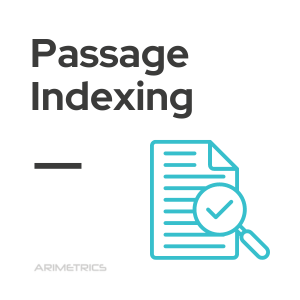Definition
Passage Indexing is a technique used in search engines to index and classify the content of passages in a document. Instead of simply indexing the entire document, search engines use algorithms to identify and understand the most important or relevant passages within the document.
This technique allows search engines to provide more accurate and relevant search results to users. In addition, it also helps improve the user experience by offering more specific answers to their search queries.
How Passage Indexing Works
Unlike indexing entire documents, Passage Indexing uses algorithms to identify the most important and informative passages of a document, extracting and classifying them separately.
To achieve this, search engine algorithms examine the content of passages, analyzing language, topic and relevance in relation to the user’s search query. The goal is to provide more accurate and complete results by showing the user only the content that really matters.
This allows users to gain useful information without having to browse the entire document and results in a more satisfying search experience. In addition, the use of the Passage Indexing technique also helps search engines to better understand the subject matter of indexed documents, which in turn can improve the quality of the search results generated.
One of the reasons passage indexing has gained popularity is its ability to handle complex and lengthy queries that could previously be difficult to answer accurately. Especially with the increasing use of natural language in search queries, Passage Indexing is becoming increasingly important to understand and categorize relevant information efficiently.
Difference between Passage Indexing and Featured Snippets
Passage Indexing and Featured Snippets are different techniques used in categorizing and searching web content. Although both aim to provide accurate and relevant answers to users, there are some key differences.
The Indexing Step focuses on understanding and analyzing passages in a document rather than simply indexing the entire document. This means that search engine algorithms identify the most important and informative passages within a document and index them separately. This results in a more accurate and comprehensive search, as users can get direct access to the information they need without having to read the entire contents of an entire document.
Examples of Passage Indexing in Google
Below are examples of how Passage Indexing works on Google in different contexts:
- Health consultation: A user searches for information about the benefits of drinking green tea. Although a web page might be primarily focused on the different types of tea, Google can identify a specific passage that discusses the benefits of green tea and show that passage in search results.
- DIY question: A user looks for instructions to fix a leak in a faucet. Instead of displaying a web page that covers all aspects of plumbing, Google can display a passage from a page that has specific instructions on how to fix a faucet leak.
- Recipe Search: A user searches for a sugar-free carrot cake recipe. Google can identify a passage within a cake recipe page that includes a sugar-free variant of the carrot cake recipe and show it in search results.
- History or event: A user searches for details about a specific historical event that occurred during the French Revolution. Google can find a relevant passage on a web page that covers the history of the French Revolution in its entirety and display that passage in search results.
